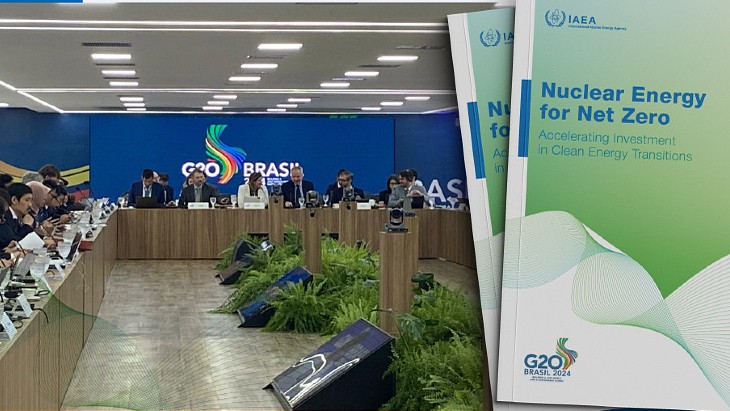The G20 includes the world's largest economies, with its member states meeting annually to discuss economic, political and social initiatives with the aim of bolstering international economic cooperation. Its members take it in turns to hold the presidency, with Brazil currently holding it.
The International Atomic Energy Agency (IAEA) is an invited participant to the Energy Transitions Working Group, which is one of 15 working groups in the policy-making process - the Sherpa Track - ahead of the next G20 leaders' summit, in Rio de Janeiro in November, when Brazil's priorities are "the fight against hunger, poverty and inequality, the three dimensions of sustainable development (economic, social and environmental) and the reform of global governance".
In the past the IAEA has presented to the G20 on the use of nuclear technologies in tackling plastic pollution but had not done so on issues related to nuclear power until this year. In this case it has given an overview of nuclear power "in the clean energy mix, underscoring the need to speed up nuclear investments to meet net zero goals, especially in emerging markets and developing economies". The agency aims to continue to contribute to the working group.
Fourteen of the G20 countries operate nuclear power plants, and six of them joined the pledge to triple nuclear capacity by 2050 made at the UN's COP28 climate change summit in Dubai last year.
IAEA Director General Rafael Mariano Grossi said: "The global clean energy transition requires nuclear energy - that is absolutely clear. In the past months the world has embraced that fact in several milestones, including by nuclear’s inclusion in the first Global Stocktake at COP28; in the pledge by more than 20 countries to triple nuclear capacity, and also in our landmark Nuclear Energy Summit last month. Through the leadership of the Brazilian Presidency of the G20, the IAEA is helping to further build on this momentum."
In a 17-page document, Nuclear Energy for Net Zero: Accelerating Investment in the Clean Energy Transitions, the IAEA "calls for a combination of a supportive policy environment and improved access to finance to scale up investments in nuclear energy, particularly in developing economies. Investments in nuclear power will need to more than double from current levels to more than USD100 billion annually if the world is to reach net zero".
The IAEA says it plans to release another report, Climate Change and Nuclear Power 2024: Financing Nuclear Energy in Low Carbon Transitions, in October in the run-up to the G20 Summit and COP29.
Thiago Barral, Secretary of Planning and Energy Transition of the Ministry of Mines of Brazil, said the IAEA's work "tells a very important story around the scientific consensus on the role of nuclear energy to reach net zero, highlighting the acknowledgement of the role of nuclear in climate agreements and the recognition by the IPCC and climate experts that nuclear is needed to achieve net zero".





_47120.jpg)

_23621.jpg)






